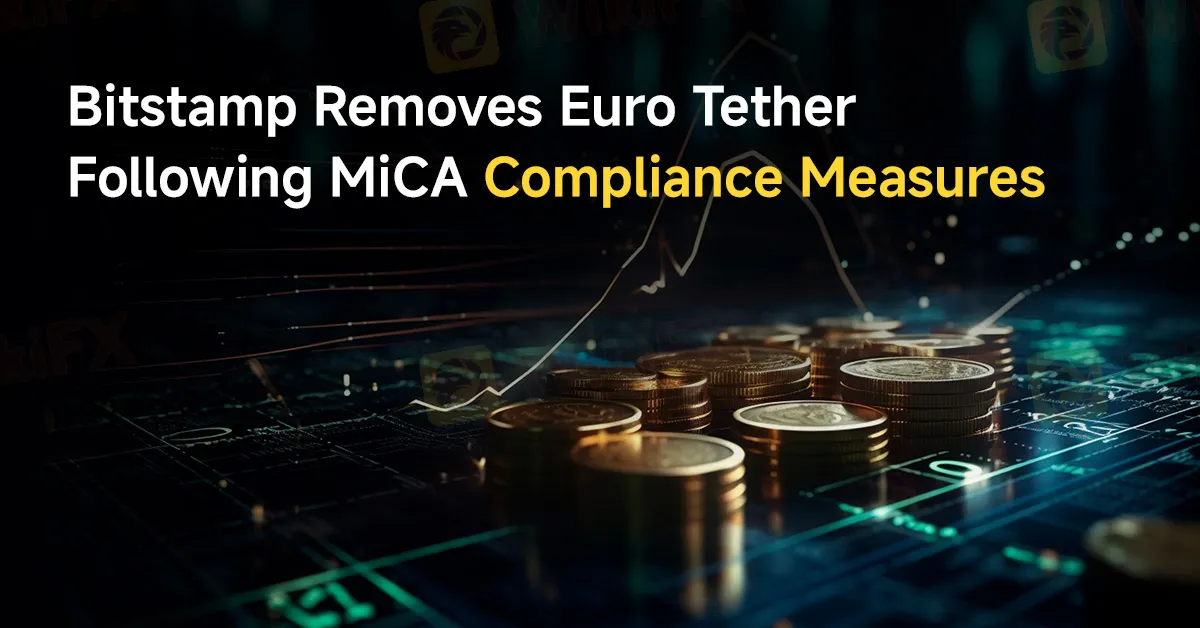简体中文
繁體中文
English
Pусский
日本語
ภาษาไทย
Tiếng Việt
Bahasa Indonesia
Español
हिन्दी
Filippiiniläinen
Français
Deutsch
Português
Türkçe
한국어
العربية
Bitstamp Removes Euro Tether Following MiCA Compliance Measures
Abstract:Bitstamp is preparing for the imminent full enforcement of Europe’s Markets in Crypto-Assets Regulation (MiCA) by announcing its decision to delist Euro Tether (EURT).

Bitstamp, a leading cryptocurrency exchange, is preparing for the imminent full enforcement of Europes Markets in Crypto-Assets Regulation (MiCA) by announcing its decision to delist Euro Tether (EURT), a stablecoin pegged to the euro.
This strategic move comes ahead of the MiCA regulation taking effect on June 30, underscoring Bitstamps commitment to full compliance with emerging European regulations.

Introduced in November 2021, Euro Tether was one of the initial euro-denominated stablecoins on Bitstamp. Despite its early adoption, EURT's market capitalization has drastically decreased from approximately $236 million in February 2022 to around $33 million currently, according to CoinGecko.
This decline is notable given that Tether, the issuer of EURT, also operates USD Tether (USDT), the largest stablecoin by market value at over $110 billion.
James Sullivan, Bitstamp‘s managing director for the United Kingdom, discussed the exchange’s proactive stance on MiCA compliance. He explained that Bitstamp has always supported a balanced regulatory approach to protect consumers while fostering cryptocurrency growth. Sullivan emphasized that Bitstamps strong compliance and security foundation positions it well to adapt to regulatory changes with minimal customer disruption. The delisting of EURT, he noted, would impact only a small percentage of clients with euro-pegged stablecoin portfolios.
Beyond the EURT delisting, Bitstamp clarified its approach to other Electronic Money Tokens (EMTs) not denominated in euros. These EMTs will remain available but with some usage restrictions for European customers. Bitstamp also stated it would neither list new EMTs that fail to meet MiCA standards nor promote such tokens.
In contrast, other cryptocurrency exchanges have taken more extensive measures in response to MiCA. Uphold, for example, delisted USDT and six other stablecoins on June 18 to align with the new regulatory framework. Additionally, Tethers CEO, Paolo Ardoino, has publicly criticized MiCA, stating that the company had no plans to comply.
Binance, another major cryptocurrency exchange, is also making adjustments for MiCA compliance. The exchange is notifying European users about changes to their services, specifically categorizing stablecoins as “regulated” or “unauthorized” based on their adherence to the new rules. Binance aims to transition users from unauthorized to regulated stablecoins and plans to implement a “sell-only” strategy for unauthorized stablecoins via its Binance Convert function, gradually phasing out non-compliant tokens.
Currently, only a few stablecoins meet MiCAs requirements, but Binance is prepared to navigate this regulatory landscape by facilitating user transitions to compliant stablecoins.
These proactive adjustments by major exchanges like Bitstamp and Binance underscore significant shifts in the cryptocurrency market as operators align with new regulatory landscapes. Their efforts aim to create a safer, more standardized environment for crypto asset trading across Europe, reflecting a broader movement within the financial technology sector to embrace regulatory changes that enhance consumer protection and market stability.

Disclaimer:
The views in this article only represent the author's personal views, and do not constitute investment advice on this platform. This platform does not guarantee the accuracy, completeness and timeliness of the information in the article, and will not be liable for any loss caused by the use of or reliance on the information in the article.
Read more

RM62k Lost Investment Scam After Joining XRP Community Malaysia on Telegram
A 30-year-old homestay manager from Chendering, Malaysia, fell victim to an online bitcoin investment scam, losing RM62,214.59. According to Kuala Terengganu police chief ACP Azli Mohd Noor, the incident unfolded after the victim joined a Telegram group named “XRP Community Malaysia” on December 19. The group promoted bitcoin investments allegedly powered by Artificial Intelligence (AI).

Russia Turns to Bitcoin for International Trade Amid Sanctions
Russian companies are increasingly using Bitcoin and other cryptocurrencies to bypass Western sanctions and facilitate international trade. The country's Finance Minister, Anton Siluanov, confirmed that cryptocurrencies mined in Russia are now being employed for foreign transactions under an experimental framework.

Robinhood Launches Options Trading in the UK by 2025
Robinhood to introduce options trading in the UK by 2025 following FCA approval. Discover how this expansion aligns with Robinhood's strategy for global growth and new features.

Hong Kong Stablecoins Bill Boosts Crypto Investments
Hong Kong's Stablecoins Bill sets regulatory standards for crypto issuers and platforms, aiming to protect investors and strengthen the city's crypto investment appeal.
WikiFX Broker
Latest News
Two Californians Indicted for $22 Million Crypto and NFT Fraud
Macro Markets: Is It Worth Your Investment?
WikiFX Review: Is Ultima Markets Legit?
Colorado Duo Accused of $8M Investment Fraud Scheme
What Impact Does Japan’s Positive Output Gap Have on the Yen?
RM62k Lost Investment Scam After Joining XRP Community Malaysia on Telegram
Victims of Financial Fraud in France Suffer Annual Losses of at Least €500 Million
Trading is an Endless Journey
Malaysia Pioneers Zakat Payments with Cryptocurrencies
FCA's Warning to Brokers: Don't Ignore!
Currency Calculator


